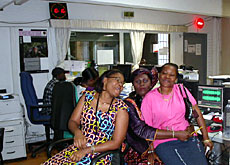Radio gives peace a chance in conflict zones

President of the Swiss Hirondelle Foundation Jean-Marie Etter tells swissinfo about the role his organisation's radio stations play in promoting peace and democracy.
Lausanne-based Hirondelle has been coordinating a series of media-based projects in some of the world’s trouble spots for more than ten years, especially in Africa.
Convinced of the importance of providing free and truthful information, its independent radio network uses the airwaves to oppose violence and poverty.
Hirondelle has managed Radio Okapi in the Democratic Republic of Congo since 2002, in partnership with the United Nations. It is the UN’s largest radio-based project.
The Swiss foundation is also about to launch a radio station in the Sudan, while in Sierra Leone it is studying ways of establishing a collaborative venture with the UN. At one time, it was also active in Kosovo.
swissinfo: How did all this begin?
Jean-Marie Etter: In 1994, I was general secretary of the Swiss section of Reporters Sans Frontières (RSF), working for Radio Agatashya in the Great Lakes region of Africa. After the aeroplane carrying the Rwandan President Juvenal Habyarimana was shot down (the event which triggered the genocide in Rwanda – Ed.), we immediately knew that something disastrous was about to happen.
So we decided to express our solidarity with the means at our disposal: journalism. With help from the Swiss Agency for Development and Cooperation, in March 1995 we established the Hirondelle Foundation. It took its name from the radio station we took over from RSF, which I had left. “Agatashya” means “swallow” in the Kinyarwanda language.
From the beginning, we concentrated on the information needs of the population and, at the same time, developed our technical capacities. We were aware that above all people needed quality information, particularly in areas of crisis.
swissinfo: On what values is Hirondelle’s work based?
J-M. E.: On strictly professional and ethical values. I believe in the universality of the professional standards of journalism and in the need to adhere to them rigorously.
Ethical values are also vitally important: respect for human dignity, honesty, and transparency in management. The key thing, though, is our independence from all political and economic influences.
In 2001, we adopted a Charter setting out the values we adhere to (independence, professionalism, honesty and openness).
swissinfo: What influence does an independent broadcaster have in countries with no free sources of information?
J-M. E.: It’s enormous. The rule of law is based not only on the three generally recognised pillars (executive, legislative and judiciary), but also on independent and well-run news media. Unfortunately, this aspect is very much neglected in all the talk about good governance. It is like making a chair with three legs rather than four, then wondering why it is unstable.
There is one thing I am certain of: without independent information, it is impossible for a country to develop healthily.
NGOs work in circumstances that are admittedly not easy, but still relatively acceptable. The problem arises when the situation deteriorates and everybody leaves. But this is the time of greatest need. And it is when everyone packs their bags that we try to get involved.
swissinfo: Hirondelle has given a voice to a whole range of individuals, organisations, political parties… has your objectivity ever been challenged?
J-M. E.: Rarely. It has happened, though, as in the case of Liberian President Charles Taylor, and other national governments. Our answer is: tell us where and when. And no one has ever been able to back up their assertions.
Some of our colleagues have paid a high price (imprisonment, beatings) for sticking rigorously to the professional standards of the profession. I must say, however, that our local journalists are extremely determined people. They have been fighting the system for a long time, long before Hirondelle arrived on the scene.
swissinfo: What challenges are you now facing?
J-M. E.: The greatest challenge is the long-term survival of the structures we have set up. Those who provide the funding are committed for the short term; they do not have a long-term vision. But since we are active in countries in crisis, where the social fabric and general conditions are unstable, reconstruction takes a long time.
The donors sometimes behave like investors, rather than actors in a political process. I think there is a lack of awareness, in aid policy, of the intrinsic importance of the media. This is a great challenge.
In addition, we have the problem of a change in scale: we are gradually getting bigger. I do not know if there is an ideal size, one we would be wise not to exceed. We tend to be led by the needs.
We are not worried about greater exposure: upsetting people who profit from corrupt systems is part of our business.
swissinfo-interview: Luigi Jorio
Hirondelle operates Radio Okapi in the Democratic Republic of Congo together with the UN and runs projects on its own, such as Star Radio in Liberia, founded in 1997 to create a neutral forum for the presidential election campaign.
Other examples are Radio Ndeke Luka, in the Central African Republic (2000), and Radio-Televisão Timor Leste, in East Timor (2002).
Hirondelle’s oldest project is not, however, a radio station, but a press agency based at Arusha in Tanzania (1996), which reports on the activities of the International Criminal Tribunal for Rwanda.
Hirondelle’s budget for 2005 was SFr8 million ($6.52 million), 15% of which was provided by Switzerland, the remainder by a dozen other countries.
About 150 people work for the organisation and its radio stations around the world have about 20 million regular listeners.

In compliance with the JTI standards
More: SWI swissinfo.ch certified by the Journalism Trust Initiative










You can find an overview of ongoing debates with our journalists here . Please join us!
If you want to start a conversation about a topic raised in this article or want to report factual errors, email us at english@swissinfo.ch.